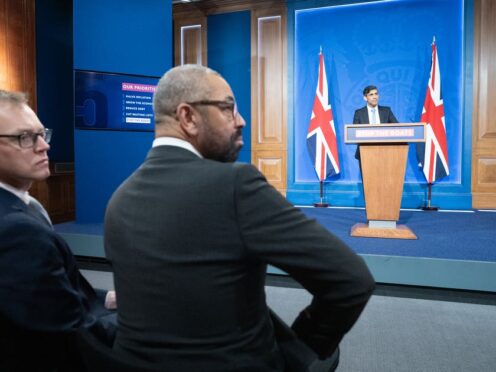Migrants who have been refused asylum will be offered thousands of pounds to move to Rwanda under a new “voluntary” scheme as the Government faces an ongoing parliamentary battle over its stalled deportation plan.
The proposals are separate to the ambition to send people to the east African nation to have their claims processed there instead of in Britain and have already been agreed with Kigali, it is understood.
The scheme is designed to remove migrants who have no legal right to stay in the UK but cannot be returned to their home country, as first reported by The Times newspaper.
It will be aimed at individuals who do not have an outstanding asylum claim and are in a position to be relocated swiftly to Rwanda, which the Government deems a safe third nation, it is understood.
The scheme is an extension of existing Home Office voluntary returns, under which migrants are offered financial assistance worth up to £3,000 to leave the UK for their country of origin.
A Home Office spokesperson said: “In the last year, 19,000 people were removed voluntarily from the UK and this is an important part of our efforts to tackle illegal migration.
“We are exploring voluntary relocations for those who have no right to be here, to Rwanda, who stand ready to accept people who wish to rebuild their lives and cannot stay in the UK.
“This is in addition to our Safety of Rwanda Bill and Treaty which, when passed, will ensure people who come to the UK illegally are removed to Rwanda.”

The Government believes the voluntary scheme can be brought into effect quickly because it will draw on existing structures outlined by the agreement already in place with Rwanda and existing voluntary returns processes, it is understood.
Labour accused ministers of “resorting to paying people” to go Rwanda upon realising their deportation scheme “has no chance of succeeding.”
Shadow immigration minister Stephen Kinnock MP said: “We know from the treaty that capacity in Rwanda is very limited, so ministers should now explain what this new idea means for the scheme as it was originally conceived, and they should also make clear how many people they expect to send on this basis, and what the cost will be.
“There have been so many confused briefings around the Rwanda policy that the public will be forgiven for treating this latest wheeze with a degree of scepticism.
“It seems that the Home Secretary is trying to find a way out of this hare-brained scheme that he himself has described as ‘batshit’.”
It comes as Rishi Sunak’s legislation to revive the grounded plan to deport some asylum seekers to Kigali heads back to the Commons where the Government will seek to overturn a string of amendments agreed by the Lords.
The Safety of Rwanda (Asylum and Immigration) Bill, which suffered 10 defeats in the unelected chamber, received an unopposed third reading – although critics made clear their reservations about the “stinker” legislation.
Changes backed by the Lords include overturning the Government’s bid to oust the courts from the process.
The move effectively blows a hole in the Bill, which is intended to prevent continued legal challenges to the stalled deportation scheme after the Supreme Court ruled the plan was unlawful.
The proposed legislation seeks to compel judges to regard the east African country as safe in a bid to clear the way to send asylum seekers who cross the Channel in small boats on a one-way flight to Rwanda.
But the amendment agreed by peers restores the jurisdiction of domestic courts in relation to the safety of the east African country and enables them to intervene.
Other changes supported by peers include safeguards to reduce the risk of unaccompanied children being sent to Rwanda, a block on the removal of victims of modern slavery and human trafficking, as well as those who worked with the UK military or Government overseas.
The Lords also approved amendments designed to ensure the legislation complies with the rule of law and that Parliament cannot declare Rwanda to be safe until the treaty with its promised safeguards is fully implemented.
Green Party peer, Baroness Jones of Moulsecoomb, branded the Bill a “stinker” while Labour frontbencher Lord Coaker urged “proper consideration” of the proposed changes to the “difficult and controversial” legislation.
Home Office minister Lord Sharpe of Epsom said it was “not an option for us to not act” and “without an alternative approach, more lives will be tragically lost at sea and the financial burden on the British taxpayer will grow”.
It sets the stage for an extended stand-off between the Commons and Lords during “ping-pong”, where legislation is batted between the two Houses until agreement is reached.
The Prime Minister had previously warned the Lords against frustrating “the will of the people” by hampering the passage of the Bill, which has already been approved by MPs.
Mr Sunak has defended the stalled plan to send migrants to Rwanda as a “worthwhile investment”, despite the public spending watchdog revealing the cost of the policy could soar to half a billion pounds.
The scheme, which is yet to see a flight take off after a series of legal setbacks, could cost taxpayers nearly £2 million for each of the first 300 asylum seekers sent to the east African nation, according to the National Audit Office (NAO).
The Commons will get a chance to debate and vote on the amendments on March 18.
